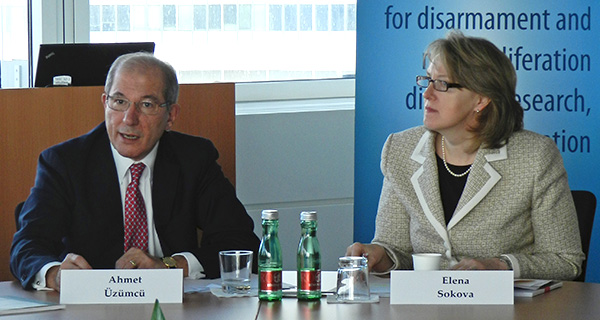

On 19 March 2013, Director-General of the Organization for the Prohibition of Chemical Weapons (OPCW), H.E. Mr Ahmet Üzümcü, delivered a presentation at the Vienna Center for Disarmament and Non-Proliferation (VCDNP) on the current status of the implementation of the Chemical Weapons Convention (CWC) and key issues on the agenda of the OPCW.
The Director-General discussed progress made in the destruction of global chemical weapons stockpiles. In 2012, the United States destroyed 90 percent of its existing stocks and the Russian Federation fulfilled over 70 percent of their chemical weapons destruction obligations, bringing the overall percentage of the eliminated chemical weapons stockpiles to 80 percent. In the context of the decision made by states parties to the CWC in 2011, which reemphasized the importance of complete destruction of chemical weapons in the shortest time possible—but did not set a new deadline—he noted that both countries were actively working to meet their obligations and are likely to complete the destruction of their stockpiles in the next two to three years.
Amb. Üzümcü provided a review of the verification and monitoring activities and mechanisms established by the OPCW. He noted that the Technical Secretariat of the OPCW is cognizant of the advances in chemical science and technology, the need to maintain high level of preparedness to carry out inspections, and continued enhancement of the efficiency of the verification process. The current mechanism of conducting inspections by picking randomly among 230 facilities, needs to be improved with due accounting of the industry's interests.

Amb. Üzümcü also highlighted the need to achieve the universality of the CWC. Its current membership consists of 188 states, but eight countries remain outside of the Convention. There are good indications that three of them—Angola, South Sudan, and Myanmar—may join the Convention in the near future. Further efforts need to be undertaken to encourage other five holdout states—Egypt, Israel, North Korea, Somalia, and Syria—to accede to the Convention at an early date.
The OPCW closely collaborates with the scientific community and educational institutions in raising awareness about the CWC and chemical weapons, including the risks associated with the dual-use chemical materials and new technologies. The OPCW Temporary Working Group on Education and Outreach of the Scientific Advisory Board is an important forum designed to facilitate such collaboration and dialogue with academic and educational institutions, as well as with the chemical industry, particularly in the area of training and information sharing.
While the responsibility for safety and security in chemical weapons rests primarily with member states, Amb. Üzümcü highlighted the vital role played by the OPCW in providing assistance and recommendations to states and to the chemical industry in the area of compliance, international standards, and emergency preparedness. One of the recent projects in this area is the establishment of the International Center for Chemical Safety and Security in Tarnów, Poland.

Another important concern is the threat of use of toxins and chemicals by non-state actors. To address this challenge, the OPCW cooperates with the Counter Terrorism Initiative Task Force (CTITF) and promotes best practices within the Open-Ended Working Group on Terrorism, which is part of the OPCW Technical Secretariat. In addition, Amb. Üzümcü underlined active involvement of the OPCW in the implementation and the advancement of UN Security Council Resolution 1540. The OPCW also supports the development of effective national mechanisms to combat the misapplication of dual-use chemicals.
In the Q&A part of the session, the Director-General commented on recent media reports regarding the alleged use of chemical agents in Aleppo, Syria, on March 19, 2013. He noted that without direct access to the affected individuals and area, it is impossible to confirm that chemical weapons had been used or to identify specific agents. Because Syria is not a member of the CWC, there is no confirmed information about its the chemical weapons capabilities or arsenals, which makes it even more difficult to obtain relevant data. The OPCW, he said, was "closely monitoring the situation" and, if requested by the UN Security Council, is prepared to investigate the alleged use.
Additional details of this discussion are provided in the Reuters report from the seminar.

By continuing to use the site, you agree to the use of cookies. more information
The cookie settings on this website are set to "allow cookies" to give you the best browsing experience possible. If you continue to use this website without changing your cookie settings or you click "Accept" below then you are consenting to this.